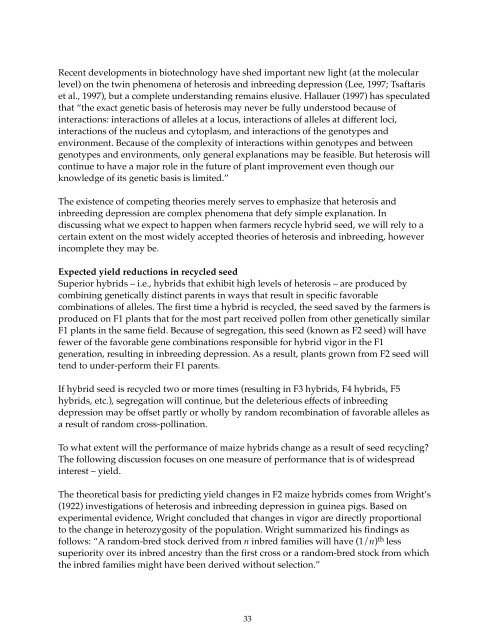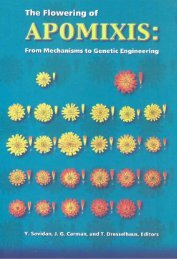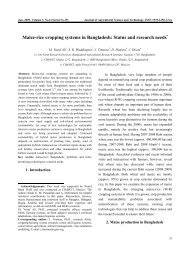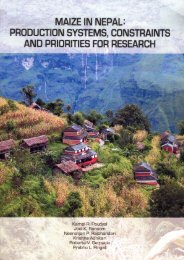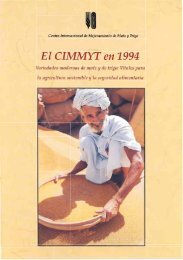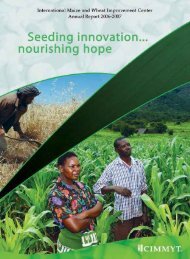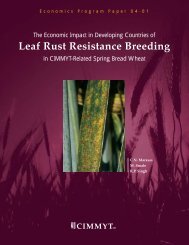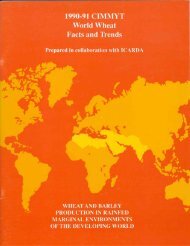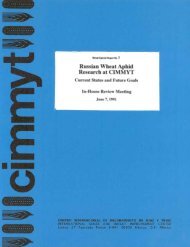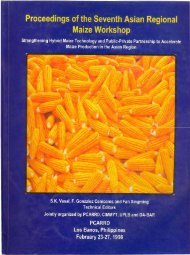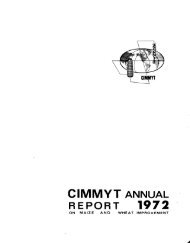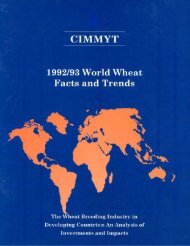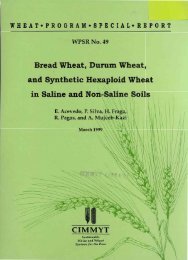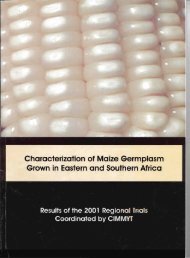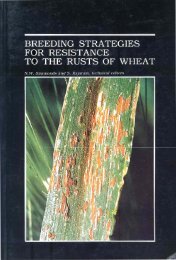Recent developments in biotechnology have shed important new light (at <strong>the</strong> molecularlevel) on <strong>the</strong> twin phenomena <strong>of</strong> heterosis and inbreeding depression (Lee, 1997; Tsaftariset al., 1997), but a complete understanding remains elusive. Hallauer (1997) has speculatedthat “<strong>the</strong> exact genetic basis <strong>of</strong> heterosis may never be fully understood because <strong>of</strong>interactions: interactions <strong>of</strong> alleles at a locus, interactions <strong>of</strong> alleles at different loci,interactions <strong>of</strong> <strong>the</strong> nucleus and cytoplasm, and interactions <strong>of</strong> <strong>the</strong> genotypes andenvironment. Because <strong>of</strong> <strong>the</strong> complexity <strong>of</strong> interactions within genotypes and betweengenotypes and environments, only general explanations may be feasible. But heterosis willcontinue to have a major role in <strong>the</strong> future <strong>of</strong> plant improvement even though ourknowledge <strong>of</strong> its genetic basis is limited.”The existence <strong>of</strong> competing <strong>the</strong>ories merely serves to emphasize that heterosis andinbreeding depression are complex phenomena that defy simple explanation. Indiscussing what we expect to happen when farmers recycle hybrid seed, we will rely to acertain extent on <strong>the</strong> most widely accepted <strong>the</strong>ories <strong>of</strong> heterosis and inbreeding, howeverincomplete <strong>the</strong>y may be.Expected yield reductions in recycled seedSuperior hybrids – i.e., hybrids that exhibit high levels <strong>of</strong> heterosis – are produced bycombining genetically distinct parents in ways that result in specific favorablecombinations <strong>of</strong> alleles. The first time a hybrid is recycled, <strong>the</strong> seed saved by <strong>the</strong> farmers isproduced on F1 plants that for <strong>the</strong> most part received pollen from o<strong>the</strong>r genetically similarF1 plants in <strong>the</strong> same field. Because <strong>of</strong> segregation, this seed (known as F2 seed) will havefewer <strong>of</strong> <strong>the</strong> favorable gene combinations responsible for hybrid vigor in <strong>the</strong> F1generation, resulting in inbreeding depression. As a result, plants grown from F2 seed willtend to under-perform <strong>the</strong>ir F1 parents.If hybrid seed is recycled two or more times (resulting in F3 hybrids, F4 hybrids, F5hybrids, etc.), segregation will continue, but <strong>the</strong> deleterious effects <strong>of</strong> inbreedingdepression may be <strong>of</strong>fset partly or wholly by random recombination <strong>of</strong> favorable alleles asa result <strong>of</strong> random cross-pollination.To what extent will <strong>the</strong> performance <strong>of</strong> maize hybrids change as a result <strong>of</strong> seed recycling?The following discussion focuses on one measure <strong>of</strong> performance that is <strong>of</strong> widespreadinterest – yield.The <strong>the</strong>oretical basis for predicting yield changes in F2 maize hybrids comes from Wright’s(1922) investigations <strong>of</strong> heterosis and inbreeding depression in guinea pigs. Based onexperimental evidence, Wright concluded that changes in vigor are directly proportionalto <strong>the</strong> change in heterozygosity <strong>of</strong> <strong>the</strong> population. Wright summarized his findings asfollows: “A random-bred stock derived from n inbred families will have (1/n) th lesssuperiority over its inbred ancestry than <strong>the</strong> first cross or a random-bred stock from which<strong>the</strong> inbred families might have been derived without selection.”33
Wright’s finding, which is based on <strong>the</strong> assumption <strong>of</strong> additive gene action, can beexpressed ma<strong>the</strong>matically as follows:where:F2 = F1 – (F1 – P) / n (1)F2 = <strong>the</strong> mean <strong>of</strong> all possible F2 double crosses among a set <strong>of</strong> F1 single crosses,F1 = <strong>the</strong> mean <strong>of</strong> all possible F1 single crosses among a set <strong>of</strong> inbred parents,P = <strong>the</strong> mean <strong>of</strong> all <strong>the</strong> parents, andn = <strong>the</strong> number <strong>of</strong> inbred parents.Kiesselbach (1933) reports results that support Wright’s conclusion. Yield data from F1hybrids with 2, 4, 8, and 16 inbred parents and <strong>the</strong>ir F2 generations confirm that yield ishighly correlated with heterozygosity. Although yield data <strong>of</strong> <strong>the</strong> inbred parents are notreported, Kiesselbach summarizes his findings by stating that <strong>the</strong> decrease in yieldobserved among F2 generation hybrids can be attributed to a reduction in <strong>the</strong> number <strong>of</strong>favorable growth factors as a consequence <strong>of</strong> close breeding. He fur<strong>the</strong>r concludes that forany hybrid in which <strong>the</strong> parents are composed <strong>of</strong> equal numbers <strong>of</strong> parent inbreds, <strong>the</strong>reduction in yield tends to be inversely proportional to <strong>the</strong> number <strong>of</strong> lines involved.Neal (1935) used Wright’s formula to predict <strong>the</strong> performance <strong>of</strong> advanced-generationmaize hybrids. Ten single crosses, four three-way crosses, and ten double crosses, <strong>the</strong>ir F2progeny, and F3 progeny <strong>of</strong> six <strong>of</strong> <strong>the</strong> single crosses were used to validate Wright’s formulawith maize. Neal reports that <strong>the</strong> single crosses, three-way crosses, and double crossesdecreased in vigor by 29.5%, 23.4%, and 15.8%, respectively, between <strong>the</strong> F1 and F2generations, which was in close agreement with <strong>the</strong> predicted losses <strong>of</strong> 31.0%, 21.0%, and15.3%. Neal concludes that <strong>the</strong> observed decreases in vigor were very consistent withWright’s formula. Powers (1941) reanalyzed Neal’s data using both arithmetic andgeometric models and found that <strong>the</strong> best agreement between observed and predictedvalues was obtained with <strong>the</strong> arithmetic model.Martin and Hallauer (1976) examined <strong>the</strong> relationship between different levels <strong>of</strong>heterozygosity in four sets <strong>of</strong> inbred lines. Each set <strong>of</strong> 21 materials included <strong>the</strong> F1, F2, andF3 generations <strong>of</strong> seven different inbred lines. Data were generated in replicated trialsgrown in five environments. Sums <strong>of</strong> squares for levels <strong>of</strong> heterozygosity were partitionedinto linear, quadratic, and lack-<strong>of</strong>-fit components. Some evidence <strong>of</strong> epistatic effects wasdetected in all four sets <strong>of</strong> materials, although <strong>the</strong> frequency <strong>of</strong> detectable epistatic effectswas significantly lower than that <strong>of</strong> linear effects. Among all four sets <strong>of</strong> materials, <strong>the</strong>authors detected 84 instances <strong>of</strong> linear, 3 instances <strong>of</strong> quadratic, and 1 instance <strong>of</strong> lack-<strong>of</strong>-fitcomponents affecting grain yield. The presence <strong>of</strong> linear components indicates thatindividual loci contribute <strong>the</strong>ir effects independently <strong>of</strong> all o<strong>the</strong>r loci, while <strong>the</strong> presence <strong>of</strong>quadratic and lack-<strong>of</strong>-fit mean squares show evidence <strong>of</strong> epistatic effects – so on <strong>the</strong> whole<strong>the</strong>se results suggest that net epistatic effects did not greatly affect grain yield.O<strong>the</strong>r researchers have developed empirical evidence in support <strong>of</strong> Wright’s formula(Hallauer and Miranda, 1989). Although <strong>the</strong> arithmetic model has been shown to be <strong>the</strong>34
- Page 1 and 2: E C O N O M I C SWorking Paper 99-0
- Page 3 and 4: CIMMYT (www.cimmyt.mx or www.cimmyt
- Page 5 and 6: Executive SummaryThis paper summari
- Page 7 and 8: AcknowledgmentsAny report that is b
- Page 9 and 10: followed a very different path comp
- Page 11 and 12: Farmers’ Management of Maize Vari
- Page 13 and 14: In recent years, new evidence has e
- Page 15 and 16: state of Guanajuato and discusses t
- Page 17 and 18: Based on the results of a survey co
- Page 19 and 20: elied with greater frequency on the
- Page 21 and 22: hybrid seed. Initially, it was gene
- Page 23 and 24: In Veracruz State, Mexico, where mo
- Page 25 and 26: Recent work in the highlands of Mex
- Page 27 and 28: producers) tend to rely on family,
- Page 29 and 30: Unintentional seed mixingUnintentio
- Page 31 and 32: Table 11. Yield depression resultin
- Page 33 and 34: Genetic driftWhen farmers select ea
- Page 35 and 36: (a) Production of a single-cross hy
- Page 37 and 38: Breeding hybrid maize begins with t
- Page 39: According to this theory, genes tha
- Page 43 and 44: Similarly, the mean of F3 generatio
- Page 45 and 46: 2. Between the F1 and F2 generation
- Page 47 and 48: In a series of on-station trials co
- Page 49 and 50: As part of the same trial, Ramírez
- Page 51 and 52: Table 19. Inbreeding depression obs
- Page 53 and 54: to 41% for the single cross (Figure
- Page 55 and 56: DiscussionEvery time a farmer recyc
- Page 57 and 58: The finding that genetic change in
- Page 59 and 60: Brennan, J.P., and D. Byerlee. 1991
- Page 61 and 62: Murillo Navarrete, P. 1978. Estimac
- Page 63 and 64: AppendixGuidelines for Estimating t
- Page 65 and 66: exactly how different the plants wo
- Page 67 and 68: As a general rule, we propose that


